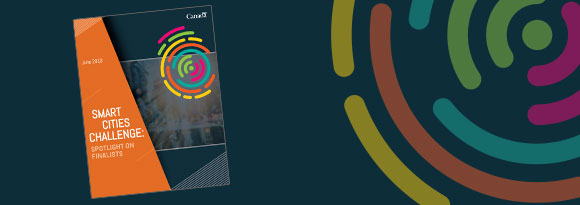Quebec City, Quebec
This page has been archived on the Web
Information identified as archived is provided for reference, research or recordkeeping purposes. It is not subject to the Government of Canada Web Standards and has not been altered or updated since it was archived.
The first round of the Smart Cities Challenge is closed. The Government of Canada announced the four winners (City of Montréal, Québec; Nunavut Communities, Nunavut; City of Guelph and County of Wellington, Ontario; and Town of Bridgewater, Nova Scotia) on May 14, 2019.

Executive Summary
- PDF Version (197.79 KB)
- HTML Version
"To improve the social fabric of our city, we have to understand it better."
– finalist video
"Our smart city is a living organism whose strength lies in its humanity, humility and dedication to correcting unacceptable disparities."
– finalist video
- Watch the finalist's proposal video
- Read the finalist's full proposal (Available in French only)
Challenge Statement
"THE SOCIAL INEQUALITIES IN HEALTH: UNDERSTANDING AND ENGAGING DIFFERENTLY"
To engage the community of Quebec City in a societal project centered on citizens' sustainable health and well-being using the collective intelligence and the deployment of digital tools that support decision-making and follow-ups.
Summary
Through the implementation of the project Social Inequalities: Understanding and Engaging Differently, the community of Quebec is committed to a societal project that focuses on sustainable health and citizens' well-being. This societal project will bring together the collective intelligence and the deployment of digital tools in support to decision-making and follow-ups.
Our proposal for the Smart Cities Challenge relies on a large study conducted by the Regional Direction of Public Health in 2012. The Study acknowledges the social inequalities in health as a major public health problem requiring a concerted action from all.
In Quebec, this fact calls for action and mobilization. The consultations directed by the City confirm that citizens are committed to promote projects with a positive impact on health.
We will leverage the knowledge of academic researchers, the commitment of institutional and business partners, the citizens experience, the wide potential of new technologies, and the expertise of the municipal staff, to initiate and launch an ambitious project in line with the innovative solutions implemented by the City of Quebec in the last decade.

Spotlight on Finalists:
Quebec City, Quebec
Population: 542,550
Focus Areas:


Prize Category:

#smartcitiesCanada
The Jury's Perspective
Read the transcript
My name is Stéphane Roche. I am a professor at the Laval University Department of Geomatics and Vice-Dean for research at the University's Faculty of Forestry, Geography and Geomatics.
There are two reasons why I would like to be part of this jury. First, I believe that the issue smart cities and territories is one of the major issues Canada will be faced with, and therefore we need a truly active strategy and to meet this challenge. The second reason is that I have been working on these issues for a number of years; I am conducting research in the field of smart cities and to be able to have access to what cities across the country would like to develop in terms of innovations is a wealth of data – access to data that are truly interesting.
The project that Quebec City submitted is truly interesting and there are two reasons for this: the first is that the issue addressed through this project is spatial justice and well-being/coexistence, i.e. how we can develop a technological solution, sensors, data infrastructure that make it possible to better understand potential relationships between sustainable population health and the urban ecosystem, in terms of both its environmental dimension and its built dimension, the structure of life in particular.
The Finalist's Perspective
Read the transcript
The smart cities challenge is a competition that called in Canadian communities to explore how data and connected technology can achieve meaningful outcomes for residence.
On screen:
Smart Cities Challenge
Winning communities
School
The finalists
$50M category: Quebec City, Quebec
Tell us about your team and your community
Frédéric Martel (IT Section Director, Quebec City): We're the Quebec City team. Quebec City is a city of 560,000 inhabitants located in the greater Quebec region, where there are 860,000 inhabitants. It is the second-largest city in the province of Quebec. It is the capital, and we are aiming for the $50 million prize.
On screen: Why did you enter the challenge?
Carole Artault-Noury (Head of the Information Resources Program, Information Technology Branch, Laval University): Quebec City is participating in the Smart Cities Challenge because, even though we are a city where people live well, we think we can live even better. The Université Laval and the Quebec City have the opportunity to work together, think the same way and share the same values. This project is also an extension of the opportunity we gave ourselves by creating Alliance Santé Québec, which enabled us to think together about the city's sustainable health and about a project called Puisard, which allows us to achieve sustainable health. Now, with the smart city, we are pushing the concept even further: in other words, we are starting from the concept and will set up specific initiatives in Quebec City. So, the objective is to have healthy people in a healthy city, improve the public's well-being in Quebec and make the Quebec City a city that will provide an even better life for future generations.
On screen: Challenge statement: "THE SOCIAL INEQUALITIES IN HEALTH: UNDERSTANDING AND ENGAGING DIFFERENTLY"
To engage the community of Quebec City in a societal project centered on citizens' sustainable health and well-being using the collective intelligence and the deployment of digital tools that support decision-making and follow-ups.
Join the conversation: #smartcitiesChallenge
Infrastructure Canada
- Date modified: